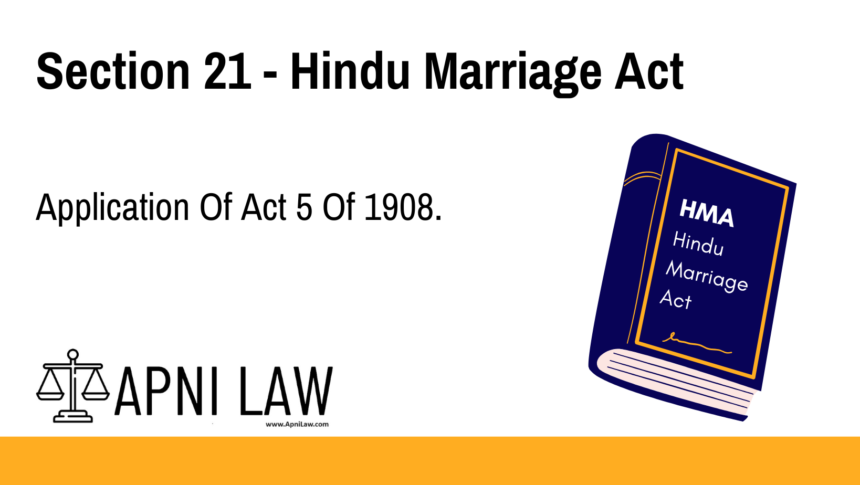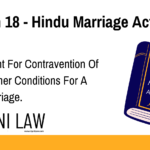Code: Section 21 – Hindu Marriage Act, 1955
“Application of Act 5 of 1908.—
Subject to the other provisions contained in this Act and to such rules as the High Court may make in this behalf, all proceedings under this Act shall be regulated, as far as may be, by the Code of Civil Procedure, 1908.”
Explanation of Section 21 – Application of Civil Procedure Code (CPC)
Section 21 of the Hindu Marriage Act, 1955 establishes that all proceedings under this Act shall be governed by the Code of Civil Procedure, 1908 (CPC), unless the Act provides otherwise or unless the High Court has framed specific rules to the contrary.
This section ensures that matrimonial matters—such as divorce, annulment, judicial separation, and restitution of conjugal rights—follow a consistent procedural framework across courts, aligning with general civil court procedures.
Key Takeaways:
- Proceedings under the Hindu Marriage Act are governed by CPC.
- High Courts have the authority to make special rules for matrimonial matters.
- Ensures consistency and fairness in matrimonial case procedures.
Illustration
Example 1: Divorce Petition
A spouse files a divorce petition under Section 13 of the Hindu Marriage Act. The court follows the procedures laid down under CPC for serving notices, filing replies, leading evidence, and delivering judgment, unless the High Court has laid down alternative rules.
Example 2: Application for Maintenance
If a party files an application for interim maintenance under Section 24 of the Act, the procedure for filing, responding, and hearing that application will also follow CPC guidelines.
Common Questions and Answers on Section 21 HMA
- Why is CPC applicable to proceedings under the Hindu Marriage Act?
Because the Act does not prescribe detailed procedural rules. CPC fills that gap and provides a standard legal process. - Can High Courts override CPC with special rules?
Yes, High Courts can frame specific procedural rules for handling cases under the Hindu Marriage Act, which take precedence over general CPC provisions where applicable. - What types of proceedings does Section 21 apply to?
It applies to all proceedings under the Act, including divorce, judicial separation, annulment, restitution of conjugal rights, and maintenance. - What happens if there’s a conflict between CPC and a provision in the Hindu Marriage Act?
The provisions of the Hindu Marriage Act will prevail over CPC due to the non obstante language in Section 21.
Conclusion
Section 21 of the Hindu Marriage Act plays a crucial role in regulating matrimonial proceedings by applying the Code of Civil Procedure, 1908. This provides clarity, uniformity, and legal structure, while allowing High Courts the flexibility to adopt context-specific rules. It ensures that parties to matrimonial litigation receive a fair and procedurally sound trial.
For more legal explanations and expert insights, visit ApniLaw.








